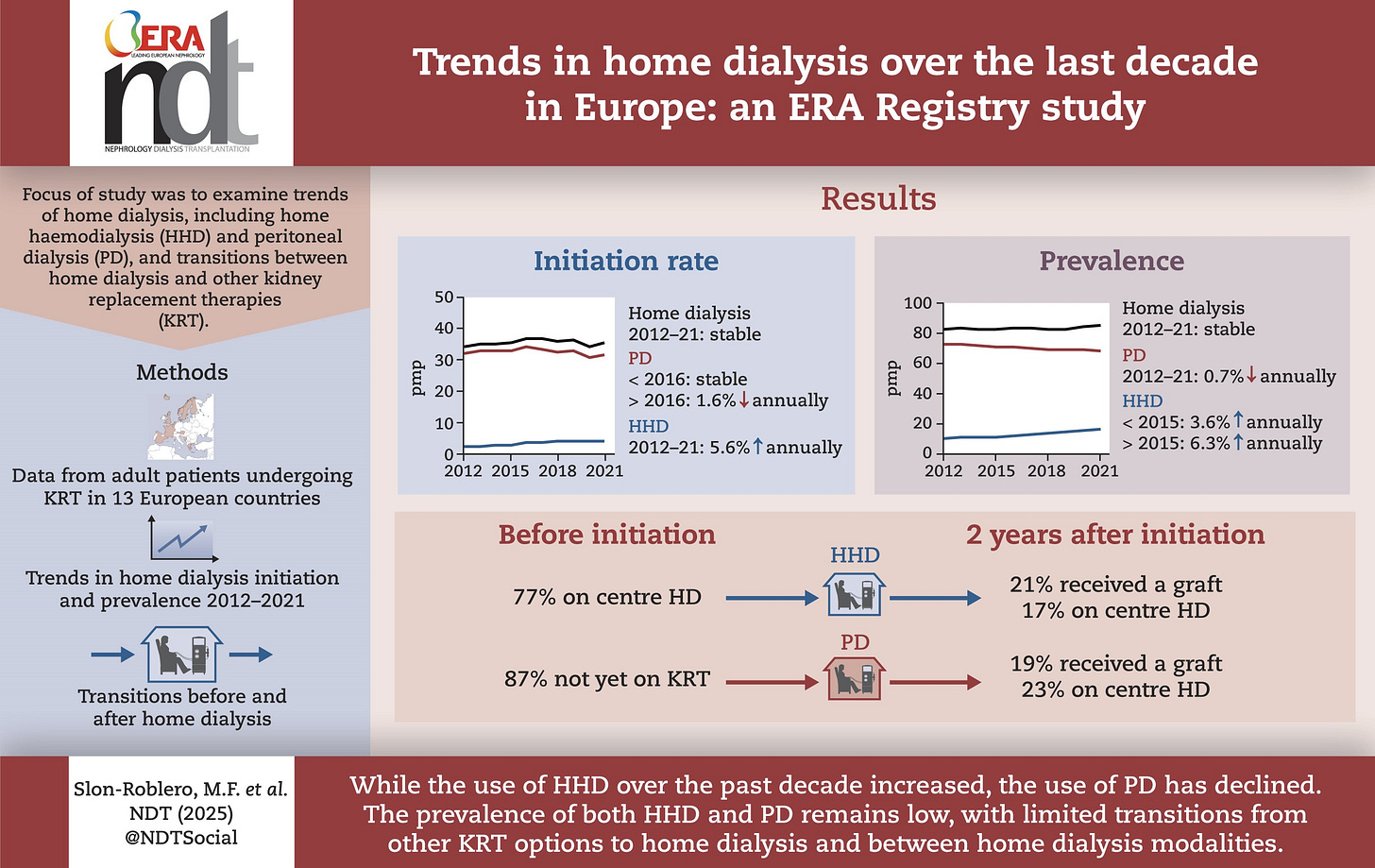My last five weeks were bookended by the World Transplant Congress and the LSI Europe Medtech meetings. From research posters to real-world evidence, the spectrum of ideas, innovations, and investments never ceases to amaze me. And right now, funding is clearly flowing into kidney health—both directly and indirectly. CMS’s $50B Rural Health Transformation push, OrganOx’s $1.5B sale to Terumo, Strive’s $550M raise, and Maze’s $150M round mark a surge of capital and confidence in the space. Strive is now the most capitalized specialty provider in the kidney space, continuing to build its data and care capabilities to serve an inevitable, value-based future. As CEO Chris Riopelle put it: “We can't change 60 years of healthcare mechanics in a week or a year or even a decade.”
Beyond the capital flows, we saw xenotransplant milestones reshape thinking around organ supply, new research expose dialysis disparities and cardio-renal risks, and community voices push for transparency, patient choice, and access. On the dialysis device side, Quanta’s partnership with Innovative Renal Care and Diality’s first home trial both signal important shifts in treatment options, especially as HDF comes online in the United States.
This month’s Signals recap captures it all: where the dollars are moving, where the science is breaking new ground, and where the community is driving change. Thanks for reading, and thanks for being here with us.1
Have tips or feedback? Hit reply or drop us a note here.
Reading time: 35 minutes
What’s Inside
News: CMS launches $50B rural program, New CPT codes for AI, MA directories on Plan Finder, OrganOx sold to Terumo, Tianyi buys Mozarc filters, Phraxis launches EndoForce, OpenAI enters health, Strive raises $550M, Maze $150M, Revalia $14.5M, Therna $10M, Diality home trial, Quanta-IRC partnership…
Research: Lancet heart failure call, GFR endpoints in HF trials, Complement proteins in DKD, Lupus nephritis case therapy, Residual kidney function benefits, Exercise in CKD care, MA inpatient days rising, Medicaid MNT patchwork, RRI launches ApolloDialDb…
Community: Epic go-live at Intermountain, ESOT registries demo, Ben Schwartz on quality reporting, RPM growth & scrutiny, Payers face margin squeeze, ESRD Networks mark 50 years, NKF advocacy on three bills, Living well post-transplant, AKF PKD update, Risa Simon on CV risks, PD declines in Europe…
Events: NephCure Parent Support, RHA conference, Women in Medicine, AdvaMed, Know Your Kidneys UK, RPA Advocacy Weekend, Countdown to a Cure NYC, ASN Kidney Week…
Jobs: Kaüna nephrologist, Renvio marketing director, Intermountain dialysis director, Elevance strategy director, Novartis MSL renal, Vertex clinical lead, Roche strategy comms, J&J regulatory head, Interwell ops manager, Medtronic reg affairs, ProKidney finance, Natera clinical science, Vantive brand strategy…
This issue is made possible by Natera. Natera supports personalized kidney care and drug development through advanced genetic testing and insights. RenasightIQ™ is a robust clinicogenomic database of 170,000+ chronic kidney disease patients enriched with longitudinal clinical and claims data. This powerful platform delivers real-world insights from early investigation to commercialization to accelerate the kidney disease drug development lifecycle.
News
POLICY & REGULATORY
CMS launches $50B Rural Health Transformation Program. The initiative, created under the One Big Beautiful Bill Act, will invest $10B annually from 2026–2030 to expand access, strengthen the workforce, and drive innovation in rural care delivery.2 States will receive cooperative agreements to fund prevention programs, provider payments, workforce pipelines, and technology adoption, including AI and remote monitoring (NACO.org, h/t Kate Sapra).
Booker, Blackburn introduce Kidney Care Access Protection Act. A bipartisan bill would modernize Medicare’s kidney care payment system, creating sustainable pathways for innovative drugs, devices, and technologies while addressing inflation pressures on dialysis providers. Kidney Care Partners, AKF, DPC, and RSN endorsed the legislation, calling it a critical step to expand access and incentivize innovation (KCP). (Senate.gov, Kidney Care Partners).3
CMS proposes major changes to 2026 Medicare Physician Fee Schedule. For the first time, two separate conversion factors will apply—slightly higher for alternative payment model participants—while methodological shifts will move payment from inpatient and procedural services toward outpatient and primary care. Nephrology nets a +1% overall impact, but inpatient dialysis (CPT 90935) faces a 9.4% cut while outpatient capitated visits (CPT 90960) see a 9% increase (Proposed Rule, h/t Rob Blaser).
AMA unveils 2026 CPT code updates for RPM, AI, and advanced therapies. The AMA released its 2026 CPT code set, adding 288 new codes (effective Jan 1, 2026) that reflect advances in patient monitoring, digital health, and AI. Highlights include new codes for remote patient monitoring over shorter timeframes, AI-assisted analysis for cardiac and wound care, expanded codes for lower extremity revascularization, and patient-centered hearing aid services. The update aims to accelerate adoption of value-based care, preventive access, and technology-driven innovation (Healio & AMA).
CMS adds Medicare Advantage provider directories to Plan Finder. Starting in 2026, Medicare beneficiaries will be able to search for in-network doctors and hospitals directly on Medicare.gov, closing a long-standing gap in transparency. CMS is partnering with SunFire Matrix to supply provider data, while also expanding supplemental benefit displays and launching an AI-powered drug search tool this fall (CMS, h/t Mark Newsom)
INDUSTRY

OrganOx acquired by Terumo for $1.5B, spotlighted at LSI Europe. Executive Chairman Oern Stuge and board member Samuel Levy shared the company’s journey from university spinout to global leader in organ preservation, emphasizing how extending organ viability can reduce discards, improve graft survival, and even ease workforce burdens. The Terumo acquisition reflects strategic alignment with its supply chain role and signals growing momentum in solid organ transport (BBC News, h/t Oern Stuge & Samuel Levy).
Tianyi Medical acquires Mozarc’s acute filters business. The deal expands Tianyi’s footprint in continuous renal replacement therapy (CRRT), making it one of the top three global players. The acquisition brings new plasma and hemoconcentration filter technologies, expanded membrane offerings, and an established facility in Mirandola, Italy, along with more than 80 employees (LinkedIn, h/t Leo Ling)
Phraxis launches EndoForce™ connector in first commercial dialysis access cases. Spartanburg Regional performed the initial procedures with the new anastomotic connector, designed to create more consistent graft outflow and reduce reinterventions. The milestone follows 13 years of development and significant investment, marking a new era in vascular access innovation (LinkedIn, h/t Geoffrey Beecher)
OpenAI signals entry into healthcare. The company has hired Nate Gross, MD (formerly of Doximity) to lead healthcare go-to-market strategy and Ashley Alexander (ex-Instagram) as VP of Health Products. After years of powering others’ tools, OpenAI now plans to launch its own health tech products, part of a larger pivot to own both infrastructure and vertical applications (Business Insider, h/t Rebecca Torrence).
Quanta and Innovative Renal Care announce U.S. partnership. Following a successful pilot at MercyOne Waterloo, the multi-year agreement will expand access to the Quanta Dialysis System across IRC programs. The portable platform offers CRRT, SLED, and IHD in a single machine, with EMR integration, cost savings, and staffing flexibility cited as key benefits (PRNewswire, h/t Alejandro Galindo & Sara Brady).
Diality begins first home trial of Moda-flx system. The company announced its first patient treated in the PRESCRIBE Diality IDE study, testing a compact home hemodialysis device with integrated reverse osmosis and flow rates up to 600 mL/min. Already FDA-cleared for professional settings, Moda-flx aims to bridge gaps between in-center and home dialysis by offering more flexibility and ease of use (Business Wire, h/t Cynthia Silva & Osman Khawar).
FUNDING
Strive Health secures $550M to scale value-based kidney care. The round combines $300M in Series D equity led by NEA with $250M in debt financing from Hercules Capital and BlackRock affiliates. Backers include CVS Health Ventures, CapitalG, Echo, Town Hall, and Redpoint, signaling strong investor confidence as Strive grows to manage $5B in annual medical spend and partnerships across all 50 states (Axios & press release, h/t Kendall Rejent). Author’s note: I had a chance to chat with CEO Chris Riopelle last week and will share more insights from our chat soon, but I appreciated this quote of his in Fierce:
"Has VBC had its ups and downs? Yes. And will it continue? Of course it will. We're not going to get this right overnight. We can't change 60 years of healthcare mechanics in a week or a year or even a decade. And so it needs to be the intrepid among us who have the confidence to say we are going to change this, and we're going to prove it each and every year along the way. And when you combine that over a decade or longer, it's going to be here to stay."
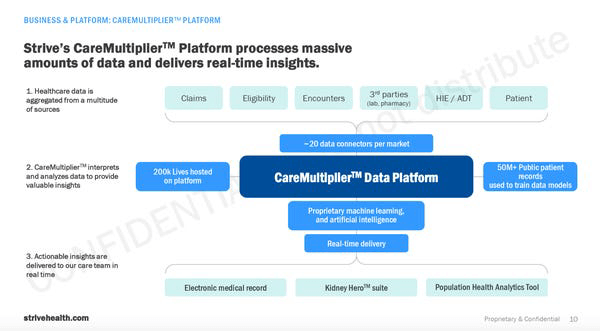
Maze Therapeutics raises $150M to advance precision kidney and metabolic drugs. The oversubscribed private placement will accelerate development of Maze’s small molecule pipeline targeting genetic drivers of disease. The company emphasized using the capital to push multiple programs forward in rare and common kidney disorders (Maze Therapeutics).
Revalia Bio raises $14.5M seed to pioneer “human data trials.” The Yale spinout revives donor organs not viable for transplant to generate predictive human data for drug development, offering pharma partners early insights into safety, dosing, and efficacy. Backed by America’s Frontier Fund and Sierra Ventures, the startup has already signed top-10 pharma customers and aims to expand beyond kidney and oncology into new therapeutic areas (Crunchbase, h/t Greg Tietjen & Jenna DiRito).
Therna Biosciences raises $10M seed to build RNA medicines with AI. Co-founded by Nazli Azimi and Hani Goodarzi, the startup is developing a lab-in-the-loop platform that combines generative AI with proprietary functional RNA models. Backed by AIX Ventures, Pear VC, and Fusion Fund, Therna aims to accelerate design and translation of next-generation programmable RNA therapies (Axios, h/t Lucy Chong).
TRANSPLANTATION
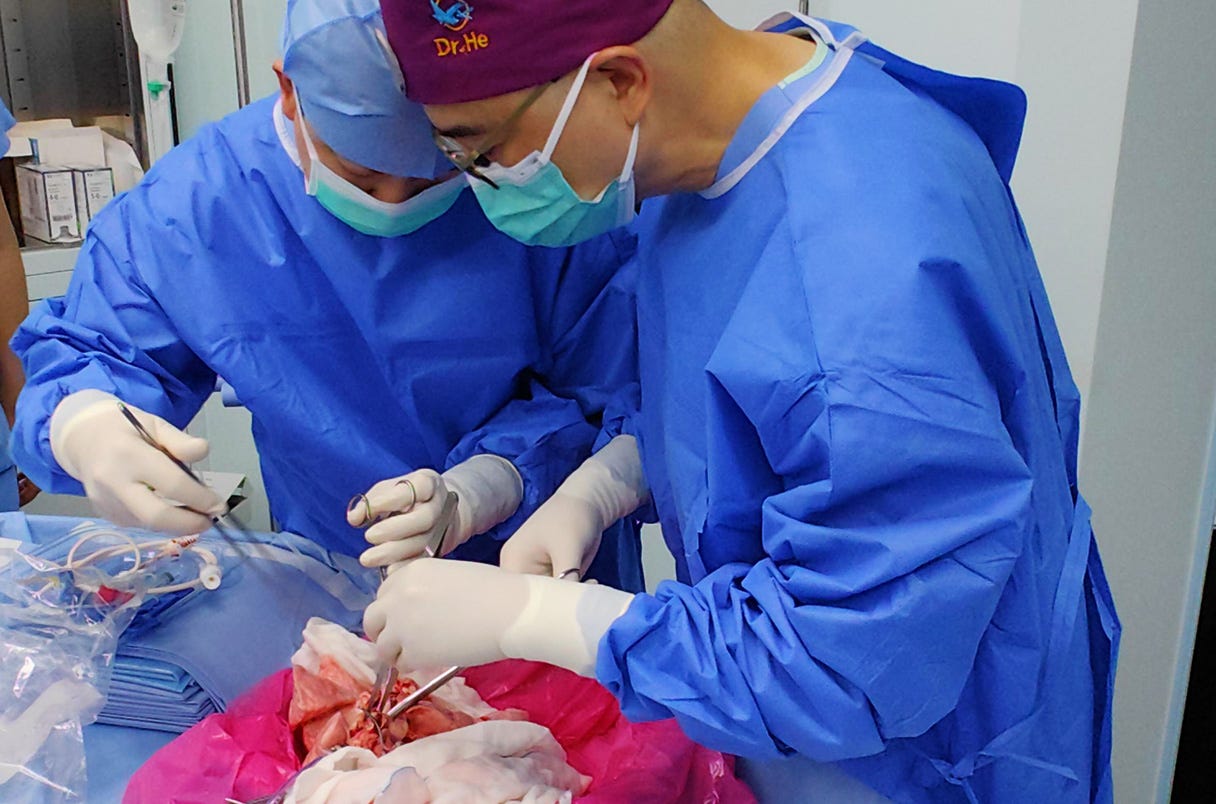
First pig-to-human lung xenotransplant performed in China. Surgeons at Guangzhou Medical University transplanted a gene-edited pig lung into a brain-dead patient, with the organ functioning for nine days before rejection. Though modest in duration, the achievement highlights progress in a notoriously difficult transplant type and adds momentum to xenotransplantation research worldwide (Nature Medicine, h/t Alexandre Loupy).
eGenesis wins FDA clearance for gene-edited pig kidney trial. The IND approval allows a Phase 1/2/3 study of EGEN-2784, a multiplex CRISPR-edited pig kidney, in dialysis-dependent ESKD patients awaiting transplant. The candidate features edits to prevent rejection, add human immune-regulatory genes, and inactivate retroviruses, building on expanded access results where patients, including Tim Andrews, have remained dialysis-free for over 7 months (eGenesis, CRISPR Medicine News).
MGH xenotransplants mark record survival milestone. Massachusetts General Hospital reported its second patient transplanted with a gene-edited pig kidney in June, while another recipient has now lived dialysis-free for more than seven months — the longest survival with a porcine organ to date. The early outcomes underscore growing momentum for xenotransplantation as a potential solution to the organ shortage (CBS News, h/t Leo Riella and team).
Hungary marks 13,000th organ transplant. The milestone was reached with a liver transplant at Semmelweis University, bringing totals to over 10,000 kidney, 1,400 liver, 900 heart, 228 pancreas, and 162 lung transplants nationwide. Experts note the pace is accelerating, with the last 1,000 procedures completed in just 2.5 years — a sign of Hungary’s growing transplant capacity (Hungary Today, h/t OVSZ).
Nepal performs its first third kidney transplant on a single patient. Surgeons at the Shahid Dharmabhakta National Transplant Center successfully completed the rare and technically complex procedure, led by Dr. Pukar Chandra Shrestha. The case, achieved through a paired exchange system, highlights Nepal’s growing transplant capabilities and builds on the center’s track record of more than 1,500 kidney transplants since 2010 (Nepyork, h/t Susan Shrestha).
Research
CARDIO-KIDNEY & OUTCOMES
The Lancet issues call to action on heart failure prevention. A new Lancet series highlights heart failure as a growing global challenge, now affecting 55 million people, and stresses the need for tailored prevention strategies that address overlapping risks with coronary, kidney, and metabolic disease. The authors urge governments, health systems, and clinicians to prioritize primary prevention to curb the rising burden (The Lancet, h/t Brendon Neuen).
Using GFR decline as an endpoint in heart failure trials faces hurdles. A European Heart Journal review explains how CKD progression measures like GFR slope or 40–50% declines are accepted endpoints in kidney disease trials, but their use in heart failure studies is complicated by early GFR drops after guideline-directed therapy. The authors outline solutions to interpret short-term kidney changes versus long-term benefits, aiming to better align outcome trials with the realities of cardio-renal disease (European Heart Journal, h/t Brendon Neuen).
Urinary Complement proteins linked to DKD progression. A study of over 1,800 person-years in advanced diabetes cohorts found urinary Complement proteins (C2, C5a, CL-K1, C6, CFH, C7) strongly predicted 10-year kidney failure risk, independent of clinical covariates. Associations were validated in nearly 3,000 additional person-years and shown to be more robust than circulating markers, underscoring the Complement system’s role in DKD progression (Nature Communications, h/t Linda Ficociello).
Case report shows promise for belimumab + voclosporin in lupus nephritis. A 28-year-old woman with refractory class III/V LN achieved remission on a regimen combining belimumab, voclosporin, MMF, and low-dose steroids, after failing prior therapies. The patient tolerated the therapy well for nine months with no flare-ups, highlighting a potential strategy for difficult-to-treat LN (JON Case Report, h/t Niloufar Ebrahimi).
Residual kidney function improves outcomes across dialysis modalities. A new review highlights the survival and quality-of-life benefits of preserving residual kidney function in both PD and HD, including better volume control, nutrition, and lower ESA use. While measurement remains inconsistent in HD, evidence supports incremental dialysis and preservation strategies as critical to long-term patient outcomes (Kidney & Dialysis, h/t Shreepriya Mangalgi).
Physical activity remains underused in CKD care despite strong evidence. A recent Nature article shows structured exercise is safe and improves fitness, strength, and quality of life across CKD, dialysis, and transplant populations. Yet uptake remains low due to workforce, training, and system-level barriers, underscoring the need for implementation-focused research and integration into routine kidney care (Nat Rev Nephrol, h/t Paul Gordon).
Medicare Advantage accounts for 25% of hospital inpatient days. A new data note shows MA inpatient days nearly doubled between 2015 and 2023, with growth especially sharp in rural areas where shares more than doubled or tripled. With nearly all MA plans requiring prior authorization for inpatient and post-acute care, the shift raises concerns about access and administrative burdens for hospitals and kidney patients alike (KFF, h/t Jamie Godwin).
Medicaid coverage for medical nutrition therapy remains patchwork. A new article in the Journal of the Academy of Nutrition and Dietetics maps state Medicaid policies and highlights major gaps limiting access to registered dietitian-led care. The authors call for stronger reimbursement frameworks to integrate MNT into chronic disease prevention and management, including for kidney disease (J Acad Nutr Diet, h/t Carly Gustafson Leon).
TRANSPLANT & IMMUNOLOGY
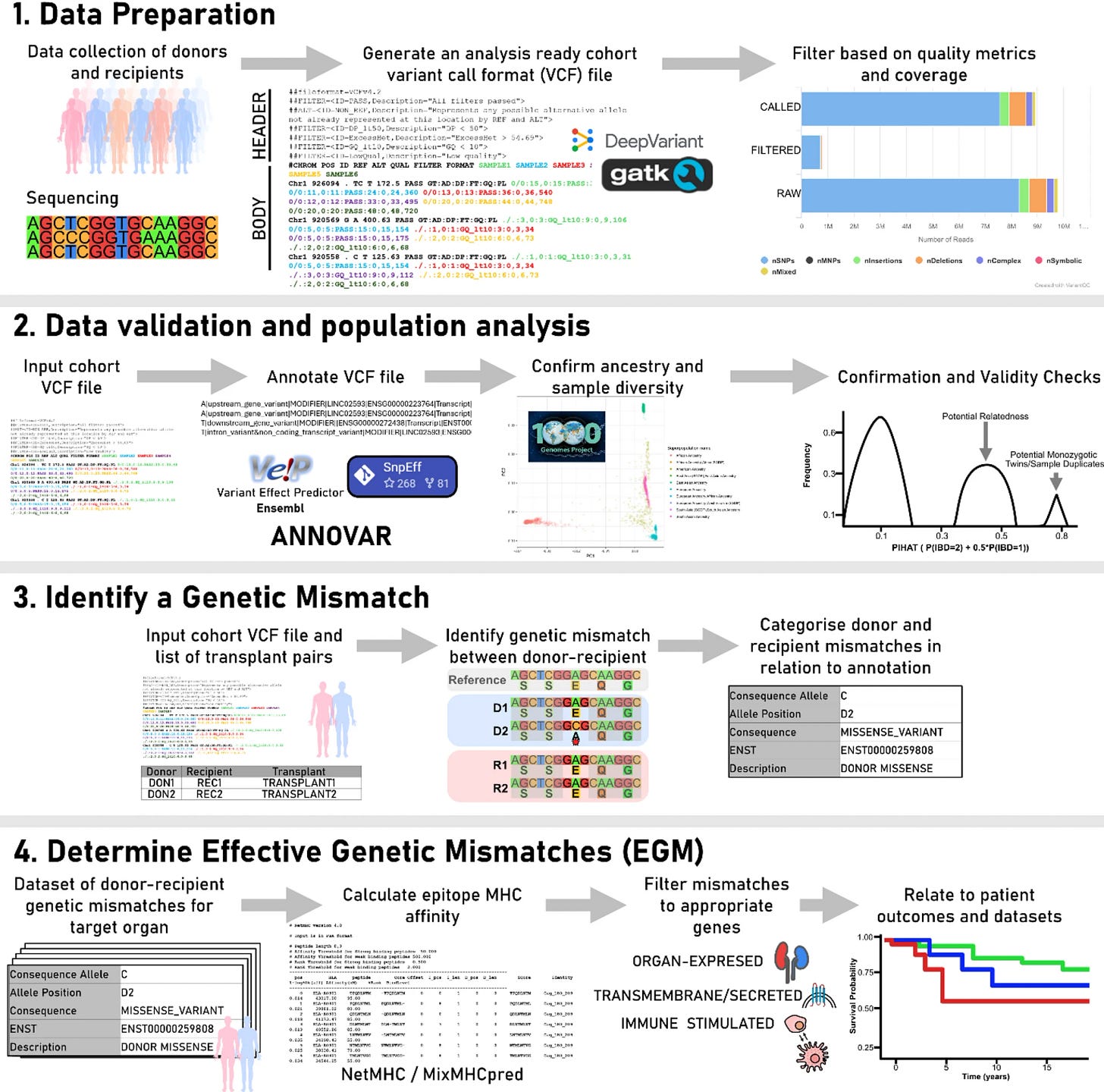
Review explores genomic donor-recipient mismatches in transplantation. An article outlines how genome-wide mismatches — beyond traditional HLA matching — may better predict alloimmune risk, emphasizing the need to consider protein expression, accessibility, and immune recognition. The review contrasts available tools, with commentary from the PIRCHE team highlighting PIRCHE’s mechanistic advantage in modeling indirect T-cell allorecognition and its strong validation across kidney and liver cohorts (Curr Transpl Reports, h/t Stephen Shoebridge & PIRCHE team).
Review calls for collaboration to advance DCD heart donation. A mini-review in AJT outlines the potential of thoracoabdominal normothermic regional perfusion (taNRP) to improve organ utilization and outcomes in donation after circulatory death. While evidence suggests taNRP is safe, cost-effective, and beneficial across thoracic and abdominal organs, ethical concerns remain around possible brain reperfusion, underscoring the need for larger collaborative donor studies (AJT, h/t Brian Lima).
Non-HLA genetics emerge as key in living donor evaluation. A review highlights how non-HLA genetic variants and antibodies can drive rejection even in HLA-matched transplants. Incorporating genetic testing into donor assessments may improve risk stratification, uncover hereditary kidney disease, and enhance donor safety, though more data are needed on long-term donor outcomes (Curr Transpl Reports, h/t Yasar Caliskan).
Updated guidelines refine donor and cord blood selection for alloHCT. A multidisciplinary panel convened by CIBMTR and NMDP reviewed recent evidence showing improved outcomes with mismatched unrelated and haploidentical donors using PTCy prophylaxis. The 2025 update emphasizes moving beyond hierarchical search algorithms to incorporate non-HLA factors like donor age in transplant decision-making (NMDP).
INNOVATION & AI

AI decision support proves cost-effective for anemia in hemodialysis. A BMC Nephrology modeling study in Germany found the Anemia Control Model delivered more QALYs at lower costs compared to standard care, with a net monetary value of €38,423 per patient. Sensitivity analyses confirmed cost-effectiveness across scenarios, highlighting AI’s potential to improve outcomes and efficiency in HD anemia management (BMC Nephrology, h/t Len Usvyat).
QUELIMMUNE therapy projected to cut costs in pediatric AKI. A Journal of Medical Economics analysis found the therapy could save ~$69K per hospitalization versus standard CRRT, driven by shorter stays and higher survival. Already FDA-approved under a Humanitarian Device Exemption, QUELIMMUNE shows potential to offset its own treatment costs and support broader adoption in critically ill children with AKI due to sepsis (J Med Econ, SeaStar).
AI-based KidneyIntelX tool improves DKD care in real-world study. A Kidney News report on the KidneyIntelX precision program found that integrating biomarker-driven risk scores into routine care prompted earlier initiation of SGLT2is and GLP-1s, more specialist referrals, and improved blood pressure and glycemic control. Among high-risk patients, treatment intensification was nearly five times more likely, underscoring the value of AI-guided stratification in closing gaps in diabetic kidney disease care (Kidney News, h/t Wisit Cheungpasitporn)
DISPARITIES & COVID
Disparities in nephrology care delay vascular access for Hispanic patients. An invited commentary in JAMA Network Open highlights findings that Hispanic adults with ESKD were 23% less likely than White patients to initiate dialysis with a usable AVF or AVG, with a third of this disparity attributable to lower access to predialysis nephrology care. The authors stress that early nephrology engagement and broader systemic interventions are critical to improving equity in kidney outcomes (JAMA Netw Open, h/t Pramod et al.).
Women on dialysis with ACS receive fewer revascularization procedures. In a study of nearly 60,000 U.S. dialysis patients with acute coronary syndrome, women were significantly less likely than men to undergo PCI (−14%), CABG (−42%), or both (−41%). Despite lower treatment rates, mortality was similar by sex, with women showing slightly lower risk of death after PCI (CJASN, h/t Silvi Shah).
COVID-19 vaccines reduce severe outcomes in dialysis and transplant patients. A Finnish nationwide cohort study compared 5,755 kidney replacement therapy patients with matched controls and found 2–3 vaccine doses cut hospitalization risk by ~47% in dialysis patients and 50% in transplant recipients, versus 76% in controls. More than three doses reduced mortality by 62% in transplant patients, underscoring the value of boosters in this high-risk group (CMI, h/t Jeff Giullian).
Community
TECHNOLOGY & INNOVATION
Carenostics expands AI platform to transplant care. Building on deployments in nephrology, pulmonology, and cardiology, the company is partnering with transplant centers to speed evaluations, keep waitlists accurate, and reduce coordinator burden. The aim is to catch eligible patients sooner while easing workload for care teams (LinkedIn, h/t Kanishka Rao).
Epic EMR goes live across Intermountain dialysis and nephrology units. The rollout marks a major shift in workflows, with 41 nephrologists, APPs, and staff rallying for the cut-over and go-live. Leaders say the transition will improve data integration and coordination of care for kidney patients across the system (LinkedIn, h/t Seth Southwick & Anitha Vijayan).
ESOT registries showcased as backbone of transplant progress. At the ESOT Congress, leaders highlighted how Pan-European registries are advancing science, standardizing practice, improving outcomes, and shaping policy. A live demo showed how the new dashboard can generate custom charts and filtered data in seconds, underscoring the platform’s potential to support clinicians, researchers, and policymakers with secure, GDPR-compliant, high-quality data (LinkedIn, h/t Devi Mey & Vincent Hassan Karam).
Purespring signals biotech optimism after $105M Series B. CEO Haseeb Ahmad marked six months at the helm with reflections from the Morgan Stanley Healthcare Conference, noting a shift toward renewed investor confidence. Backed by an £80M ($105M) oversubscribed Series B led by Sofinnova Partners last October, Purespring is advancing its podocyte-targeting AAV gene therapy platform, with lead program PS-002 for IgA nephropathy moving toward Phase I/II trials (LinkedIn & company release, h/t Haseeb Ahmad).
Healthcare’s quality measurement problem: “measuring everything, improving little.” Writing in The Surgeon’s Record, Ben Schwartz argues that quality reporting consumes massive resources yet fails to improve outcomes, hitting small practices especially hard. He calls for fewer, clinically meaningful metrics, streamlined infrastructure, and AI-enabled tools to turn quality tracking from a compliance burden into a driver of real patient value (The Surgeon’s Record, h/t Ben Schwartz).
Fresenius and RRI launch global dialysis database. The ApolloDialDb captures data from more than 543,000 patients across 40 countries, including over 35M lab results and 140M treatment observations. Built with strict anonymization and harmonization protocols, the database offers a new resource for real-world research, regional comparisons, and AI model development in kidney care (Kidney International Reports, h/t John Larkin).
Remote patient monitoring adoption rising, but gaps and scrutiny loom. Research shows RPM uptake is accelerating nationally, though rural and low-income hospitals lag behind, raising equity concerns. At the same time, legal experts caution that regulators are expected to intensify oversight of RPM use and billing, creating both opportunities and risks for providers (Circulation, h/t Rohan Khera; Manatt).
Payers face margin pressure across all lines of business. Earnings calls show higher-than-expected utilization and medical loss ratios in MA, ACA, Medicaid, and group markets, creating a “year of pain” for insurers. Margin recovery efforts will mean premium hikes, tighter networks, and sharper demand for partners who can prove cost savings—creating both headwinds and opportunities for health startups (LinkedIn, h/t Joe Connolly).
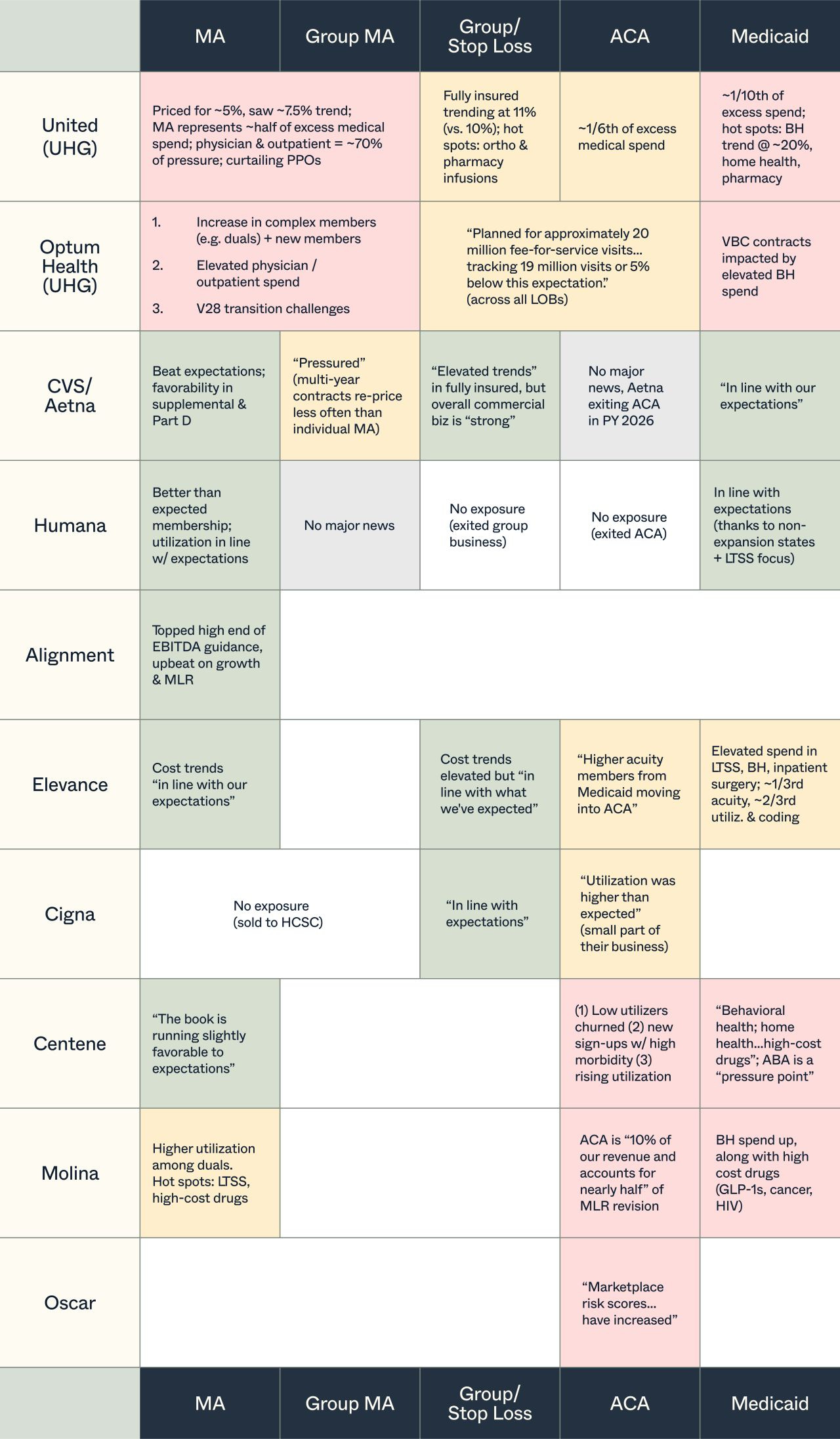
POLICY & ADVOCACY
ESRD Networks mark 50 years of collaboration and patient-centered care. A perspective piece in CJASN reflects on the history and impact of the 18 ESRD Network Organizations, which partner with CMS to oversee dialysis quality and emergency response. Through the Forum of ESRD Networks, initiatives like patient and provider toolkits, a Kidney Patient Advisory Council, and strategic alliances with national partners continue to advance equity, patient voice, and quality improvement across U.S. kidney care (CJASN, h/t Kam Kalantar-Zadeh).
NKF highlights three bills critical for kidney patients and donors. The Living Donor Protection Act would prohibit insurance discrimination and ensure job-protected recovery; Enhanced Premium Tax Credits must be extended by September 30 to avoid steep premium hikes; and the Treat and Reduce Obesity Act would expand Medicare coverage for dietitian services and weight-loss drugs, helping prevent CKD progression (NKF, h/t Lauren Drew).
Frontiers editorial calls for person-centered care to help transplant recipients “live well.” A special issue of Transplant International, introduced by Kevin Fowler and colleagues, highlights how quality of life after transplant depends not just on survival but also on physical, mental, and social well-being. Patient voices and new studies emphasize integrating PROMs, self-management support, workforce reintegration strategies, and telehealth tools into transplant care, underscoring the need to reengineer models around recipients’ lived experience (Transplant Int, h/t Kevin Fowler).
AKF spotlights advances in PKD care for Awareness Day. Chief Medical Officer Pranav Garimella highlighted progress in diagnosing and treating polycystic kidney disease, underscoring the importance of awareness and continued innovation in a condition that still lacks a cure (AKF, h/t Pranav Garimella).
Patient voice warns of hidden cardiovascular risks from transplant meds. Kidney transplant recipient Risa Simon shared how tacrolimus and other immunosuppressants can accelerate plaque buildup, often without symptoms, leading to overlooked heart disease risk. She called for proactive cardiovascular oversight alongside kidney monitoring, echoing a recent review in Cardiorenal Medicine (LinkedIn, h/t Risa Simon).
NKF petitions for transparency in declined organ offers. Patients on the kidney waitlist receive an average of 16 organ offers, but often aren’t told when a transplant team declines one on their behalf. After CMS dropped a proposed disclosure requirement from its IOTA policy, NKF launched a petition urging regulators and transplant centers to prioritize patient communication and shared decision-making (NKF).
PD use declining in Europe despite known benefits. New analysis in NDT shows falling rates of peritoneal dialysis initiation across European countries, sparking concern from clinicians and advocates. Several physicians stressed that patients are often not fully informed or supported to choose home therapies, calling for coordinated action by policymakers, clinicians, and industry to close the gap between evidence and practice (LinkedIn, h/t Jeffrey Perl, Peter Rutherford, Vincent Carsillo).
Events Calendar
NephCure Parent Support Group (Online, Sept 15 at 8PM ET)
Renal Healthcare Association (Orlando, September 16-19)
Women in Medicine Summit (Chicago, September 18-20)
AdvaMed MedTech (San Diego, October 5-8)
Know Your Kidneys UK (Online, October 7)
RPA Advocacy & Innovation Weekend (DC, Oct 10-11)
Countdown to a Cure NYC (New York, October 22)
ASN Kidney Week (Houston, November 3-6)
APCH (Lucknow, India, Nov 27-29)
Jobs
Nephrologist (Miami, FL) — Kaüna (Say hello!)
Director of Marketing — Renvio
Dialysis Services Director — Intermountain Health
Director, Total Rewards — CareDx
Strategy & Program Development Director — Elevance
Medical Science Liaison (MSL) Renal — Novartis
Head of Regulatory Affairs — Johnson & Johnson
Senior Manager, Provider Operations — Interwell Health
Principal Reg Affairs Specialist — Medtronic
Sr. Manager Finance & IR — ProKidney
Senior Director, Clinical Science — Natera
Dir, Brand Strategy & Program Mgmt — Vantive
Sr. Field Education Specialist — Mozarc Medical
Browse hundreds more at jobs.signalsfs.com
Work with us
Have you seen the new Signals Group website? We are expanding to support the growth of this community. Whether you’re looking to increase awareness for your work, prepare for your next milestone, or looking to enter a new market, we’d love to hear from you. We support mission-aligned organizations advancing kidney health.
Sponsor — Share your work with 20,000 kidney professionals
Grow — Partner with us to reach your next company milestones
Share — Tell us about your next milestones and let’s chat
This audio summary may include variations in pronunciation and is intended for informational purposes only. For complete accuracy and source attribution, please refer directly to the original written materials and cited sources. Always consult trusted references when interpreting medical or scientific content.
![Signals From [Space]](https://substackcdn.com/image/fetch/$s_!IXc-!,w_40,h_40,c_fill,f_auto,q_auto:good,fl_progressive:steep/https%3A%2F%2Fsubstack-post-media.s3.amazonaws.com%2Fpublic%2Fimages%2F9f7142a0-6602-495d-ab65-0e4c98cc67d4_450x450.png)
![Signals From [Space]](https://substackcdn.com/image/fetch/$s_!lBsj!,e_trim:10:white/e_trim:10:transparent/h_48,c_limit,f_auto,q_auto:good,fl_progressive:steep/https%3A%2F%2Fsubstack-post-media.s3.amazonaws.com%2Fpublic%2Fimages%2F0e0f61bc-e3f5-4f03-9c6e-5ca5da1fa095_1848x352.png)
![Signals From [Space]](https://substackcdn.com/image/fetch/$s_!NnOt!,w_144,h_144,c_fill,f_auto,q_auto:good,fl_progressive:steep,g_auto/https%3A%2F%2Fsubstack-post-media.s3.amazonaws.com%2Fpublic%2Fimages%2F688fc47b-7202-4a2e-b4f4-fea2b047ab1b_1500x1500.png)







